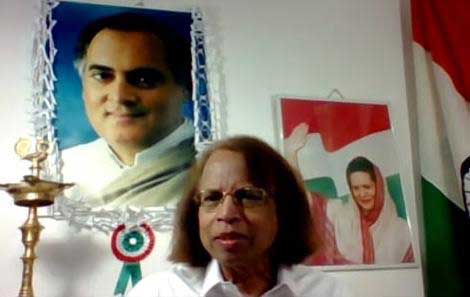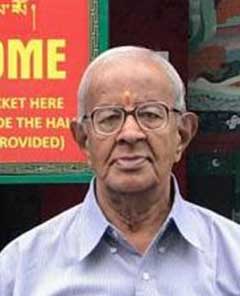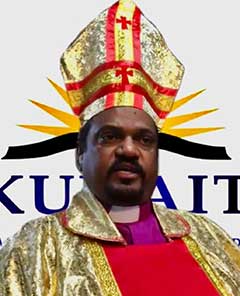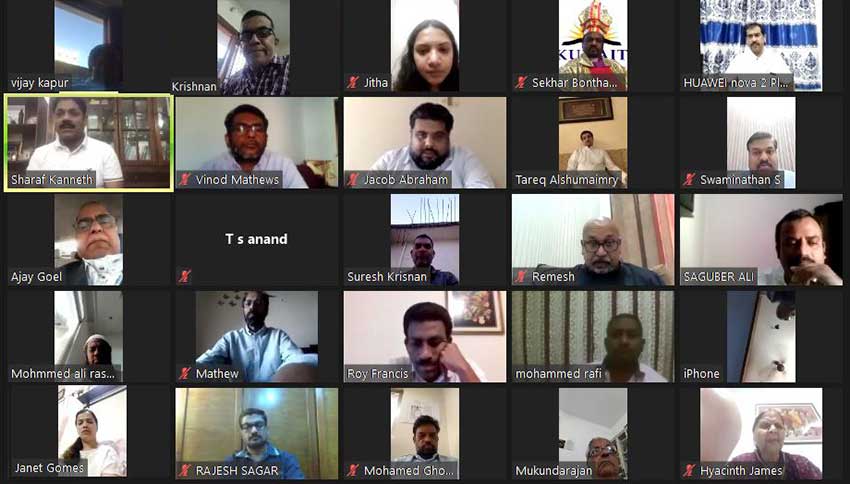Former Indian Prime Minister Rajiv Gandhi’s 29th Martydom Day Observed
Saturday, May 23, 2020
The 29th Memorial Day of former Indian Prime Minister who was assassinated by a Srilankan suicide bomber was observed on May 21, 2020 at an Interactive Zoom meeting organised by Markos Williams, Chairman – Rajiv Gandhi Awards Committee.
The Memorial meeting commence with the lighting of the traditional lamp by Markos Williams. N.R. Sampath, former General Manager of Kuwait India International Exchange Company, Archbishop Dr Sekhar Bonthapuri of the Kuwait Lutheran Evangelical Church and Sharafuddeen Kanneth, President, Kuwait Kerala Muslim Cultural Centre paid rich tributes to Rajiv Gandhi as they addressed the meeting as representatives of the Hindu, Christian and Muslim community symbolising communal harmony.
A unique aspect of the Rajiv Gandhi Memorial Online Zoom Meeting was the participation of a cross section of the Indian Community from Kuwait and the Indian states of Tamilnadu, Kerala, Andhra Pradesh, Telengana, Karnataka, Maharashtra, Pondicherry and New Delhi.

Ms Janet V Gomes, educationist and social worker administered the Anti Terrorism Pledge that urged participants to “work for the emotional oneness and harmony of all the people of India regardless of caste, creed, religion or language and to resolve differences through dialogue and constitutional means without resorting to violence”.

"I take this solemn pledge that I will work for the emotional oneness and harmony of all the people of India regardless of caste, creed, religion or language. I further pledge that I shall resolve all differences among us through dialogue nd constitutional means without resorting to violence"
 Speaking on the occasion, NR Sampath said, “Twenty nine years have passed since Rajiv Gandhi left us, but the inspiring leadership he gave to India and his great contribution for the growth and all- round development of India remain evergreen in our memory. He played an important role in setting up the Indira Gandhi Open University, which has catalysed education among the economically backward sections of society. He made it his mission to ensure that educational facilities was made available to the rich and poor in rural and urban areas alike. His special focus on the computer revolution ensured that India’s technological progress kept pace with the rest of the world. His dream was to bring India to the threshold of the 21st century, free of the burden of poverty, legacy of the colonial past and capable of meeting the aspirations of the people”.
Speaking on the occasion, NR Sampath said, “Twenty nine years have passed since Rajiv Gandhi left us, but the inspiring leadership he gave to India and his great contribution for the growth and all- round development of India remain evergreen in our memory. He played an important role in setting up the Indira Gandhi Open University, which has catalysed education among the economically backward sections of society. He made it his mission to ensure that educational facilities was made available to the rich and poor in rural and urban areas alike. His special focus on the computer revolution ensured that India’s technological progress kept pace with the rest of the world. His dream was to bring India to the threshold of the 21st century, free of the burden of poverty, legacy of the colonial past and capable of meeting the aspirations of the people”.
 Archbishop Dr Sekhar Bonthapuri extolled Rajiv Gandhi’s contribution to the development of India, He said, “Development is not about factories, dams and roads. Development is about people. The goal is material, cultural and spiritual development for the people. The human factor is of supreme value in development” these are the words of late Rajiv Gandhi, former Indian Prime Minister who was a beacon of hope for the people of India.
Archbishop Dr Sekhar Bonthapuri extolled Rajiv Gandhi’s contribution to the development of India, He said, “Development is not about factories, dams and roads. Development is about people. The goal is material, cultural and spiritual development for the people. The human factor is of supreme value in development” these are the words of late Rajiv Gandhi, former Indian Prime Minister who was a beacon of hope for the people of India.
The Holy Bible says “A good shepherd lays down his life for his sheep”. I see the fulfilment of this scripture in the life of Rajiv Gandhi who sacrificed himself for the India of his dreams.
Within a short span of life, he left an indelible mark on Indian society and politics alike. He introduced bold reformative measures for the betterment of society and the development of a free India.
While concluding he recalled the words of Rajiv Gandhi who said, “” the spiritual links that bind us to our heritage, to our traditions, must not be broken in the name of progress and prosperity and modernization”.
 Sharafuddeen Kanneth, in his address said, “Nowadays, there is a lot of talk about Digital India. Digital India did not happen in 2014. It had its roots in August 1984 when Rajiv Gandhi established the Centre for Development of Telematics (C-DOT). The Centre for Development of Telematics is an Indian Government owned telecommunications technology development centre. It was established with the initial mandate of designing and developing digital exchanges. C-DOT has expanded to develop intelligent computer software applications. C-Dot revolutionized the communication network of cities and villages in India and the commonly visible PCO (Public Call Office) came into existence. Rural areas were connected to the outside world by these PCO booths. The Mahanagar Telephone Nigam Limited (MTNL) and Videsh Sanchar Network Limited (VSNL) grew under the leadership of Rajiv Gandhi.
Sharafuddeen Kanneth, in his address said, “Nowadays, there is a lot of talk about Digital India. Digital India did not happen in 2014. It had its roots in August 1984 when Rajiv Gandhi established the Centre for Development of Telematics (C-DOT). The Centre for Development of Telematics is an Indian Government owned telecommunications technology development centre. It was established with the initial mandate of designing and developing digital exchanges. C-DOT has expanded to develop intelligent computer software applications. C-Dot revolutionized the communication network of cities and villages in India and the commonly visible PCO (Public Call Office) came into existence. Rural areas were connected to the outside world by these PCO booths. The Mahanagar Telephone Nigam Limited (MTNL) and Videsh Sanchar Network Limited (VSNL) grew under the leadership of Rajiv Gandhi.
Rajiv Gandhi increased the quantum of government support for the development of science and technology as well as industry. He laid special emphasis on the computer revolution which led to the formation of computerised educational institutions in the country. He computerized airlines, military and telecommunications.

As early as the 1980s, Rajiv Gandhi realised that a truly developed India could only be achieved when all of India including rural India has access to the best of education. Without accessible and affordable education, computerisation or a Digital India would only have remained a distant dream. Rajiv Gandhi translated that dream into reality, Sharafuddeen Kanneth declared.
In his concluding remarks, Markos Williams quoted Rajiv Gandhi who said, ““Let us build an India Proud of her independence; Powerful in defence of her freedom; Strong, self-reliant in agriculture, industry and front rank technology; United by bonds transcending barriers of caste, creed and region; Liberated from the bondage of poverty and of social and economic inequality. An India Disciplined and efficient; Fortified by ethical and spiritual values; A fearless force for peace on earth; The school of the world, blending the inner repose of the spirit with material progress. A new civilisation, with the strength of our heritage, the creativity of the springtime of youth and the unconquerable spirit of our people.”
s